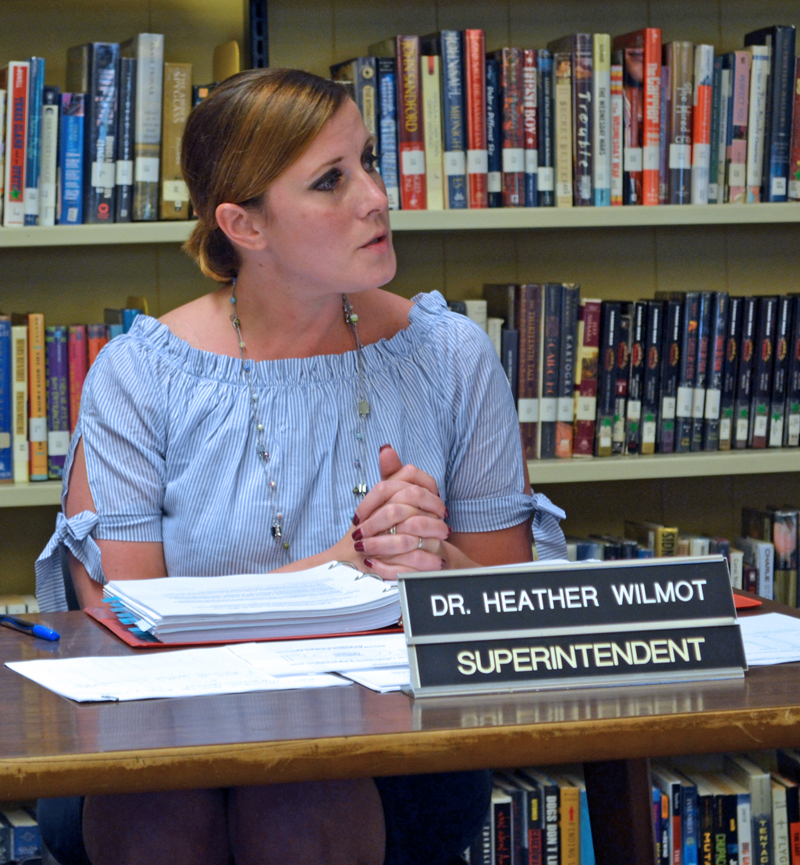
Wiscasset School Department Superintendent Heather Wilmot updates the Wiscasset School Committee about the development of a regional special education program Thursday, June 22. (Abigail Adams photo)
The Sheepscot Regional Education Program is still looking for a home for 2017-2018, Wiscasset School Department Superintendent Heather Wilmot said.
The program is a collaboration between five school districts to improve the efficiency of special education services. The Maine Department of Education awarded the districts a grant to fund the program.
The plan is to host the program in Wiscasset in 2018-2019, Wilmot said. The superintendents of the five districts will soon meet to determine the program’s location in 2017-2018 and finalize an agreement to solidify their new partnership, she said.
The Wiscasset School Committee voiced support for the new program during its Thursday, June 22 meeting and voted unanimously to authorize committee Chair Michael Dunn to sign the agreement.
The Wiscasset School Department led the pursuit of the grant for the program, which will serve students with special behavioral needs in grades six through 12, and will save on the cost of out-of-district placements.
The department partnered with AOS 93, AOS 98, RSU 1, and RSU 12 to apply for the grant.
The grant application received the highest marks out of the 21 applications the Department of Education received, Wilmot said. The Department of Education recently awarded a one-time grant of $518,000 to launch the program.
The regional program will save on the cost of tuition, facilities maintenance, administration, and financial oversight. The estimated five-year savings from the program could be $8,086,664, according to a Department of Education press release.
AOS 93 consists of Bremen, Bristol, Damariscotta, Jefferson, Newcastle, Nobleboro, and South Bristol. AOS 98 consists of Boothbay, Boothbay Harbor, Edgecomb, Georgetown, and Southport. RSU 1 consists of Arrowsic, Bath, Phippsburg, and Woolwich. RSU 12 consists of Alna, Chelsea, Palermo, Somerville, Westport Island, Whitefield, and Windsor.
The Wiscasset School Department is the fiscal agent for the grant, because it was initially slated to be the host site for the program, Wilmot said. After conversations with faculty and staff, it was determined that Wiscasset Middle High School is not ready to host the program in the upcoming school year.
The grant application will need to be amended once its off-site location is determined, Wilmot said. However, the Wiscasset School Department intends to host it on-site in 2018-2019.
The grant will cover the cost of the program through the end of the 2018-2019 fiscal year, Wilmot said. Expenditures will include salaries for two lead teachers, six educational technicians, a social worker, part-time occupational and physical therapists, psychologists, and other intervention professionals, she said.
The grant will also fund professional development and facility renovations and maintenance for the program.
The program will provide highly therapeutic supports to students who would otherwise attend special service private schools outside the district, Wilmot said. The program will keep students close to their own communities and save school districts on tuition costs.
The participating school districts will form a board of directors to oversee hiring for the program, Wilmot said. The superintendents and special services directors of the participating districts are working to develop criteria for program enrollment and staffing.
The program will start by serving older students and add middle school students later, Wilmot said.
As the fiscal agent, the Wiscasset School Department is already thinking to the 2020-2021 fiscal year to ensure the program will be self-sustainable after the expiration of the grant, Wilmot said.
“We’re thinking about what we need to do to develop a sustainable program,” Wilmot said. “How are we going to use participation fees and tuition to generate enough revenue to make it sustainable?”
The Sheepscot Regional Education Program was one of two Department of Education grants the Wiscasset School Department pursued. The department also submitted a grant, in partnership with Brunswick and Topsham, to fund the transportation costs for the districts’ homeless students to ensure they can attend school.
The number of homeless students the Wiscasset School Department serves is on the rise, Wilmot said. While the grant application was not successful, “I’m proud of the work we did to try to support these students,” she said.
The school committee commended Wilmot for her work on the grants. “This is something we tasked (Wilmot) to do when we hired her,” Dunn said. “We asked her to grow our programming and revitalize our schools.”



